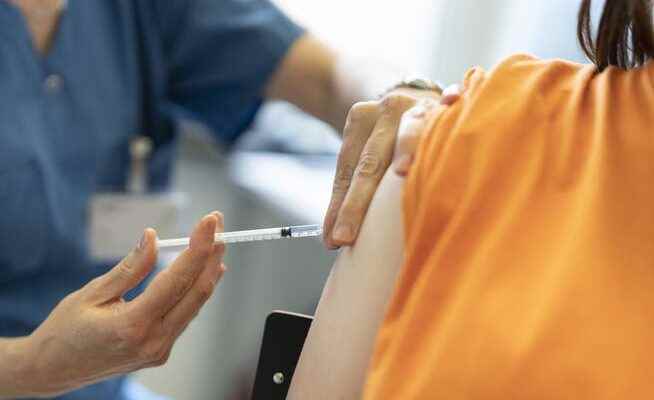An international study confirms the testimonials of thousands of women.
The Covid vaccination has an influence on the period in certain women. Vaccination Center Children’s Hospital Zurich, July 1, 2021.
The UK Medicines Agency has already received more than 51,000 reports menstrual disorders received after the corona vaccination. These include delayed, unusually heavy and unexpected menstrual bleeding. It has not yet been possible to answer whether these are due to the vaccination or not. Because the female menstrual cycle is also naturally subject to considerable fluctuations.
The results of a study by American researchers shed more light on this darkness. Alison Edelman from the University of Portland and her colleagues investigated whether the corona vaccination changes the length of the menstrual cycle. A previous study of a small group of women had fueled such a suspicion. Averaging 28 days long, the female menstrual cycle consists of two parts: a period of around 21 days when the egg matures and travels to the uterus, followed by another when the uterine lining is shed and the woman has her menstrual period.
The scientists based their calculations on the anonymized data of almost 20,000 women from all over the world who track their periods with the smartphone app Natural Cycles. This included the course of the body temperature and the duration of the menstrual bleeding of the subjects. The app is used in particular by women who want to have children and those who want to do without hormonal contraceptives. Because during ovulation and thus during the period in which a woman can become pregnant, the body temperature rises by 0.2 to 0.5 degrees Celsius.
Cycle significantly extended
As the researchers in “British Medical Journal” explain, around 15,000 of the app users had been vaccinated against Sars-CoV-2, the rest not. The majority of those vaccinated had received the mRNA vaccine from Pfizer/Biontech or Moderna and a minority from AstraZeneca or Johnson & Johnson.
The result of the study confirmed what the previous study had already brought to light: the monthly cycle in which the vaccination took place lasted on average just under a day longer than usual, and this was the same for all vaccines. Subsequent cycles were then again of the same length as those prior to immunization. Nevertheless, there were subjects in whom the cycle shifts were significantly more pronounced. These were women who had been vaccinated against Corona twice in the same monthly cycle. In these, that cycle was extended by around four days and the subsequent one by almost a day. In contrast, the immunization had no influence on the number of bleeding days.
Dorothea Wunder, gynecologist and reproductive medicine specialist at the Cantonal Hospital in Freiburg, also regularly sees women who contact her about menstrual disorders after the vaccination. “Many are worried because they don’t know if it’s something bad,” says the doctor. As she also admits, the menstrual cycle is quite prone to failure. A number of external and internal influences could change it. Examples are infections, psychological stress and heavy physical exertion. Whether the vaccination also has such an effect has not yet been investigated, the gynecologist adds. Here she sees a need for action.
Among other things, it is unclear how the vaccination could shift the female cycle. According to Thomas Böhm, physician and immunologist at the Max Planck Institute for Immunobiology and Epigenetics in Freiburg im Breisgau, the effect is likely to be related to the vaccination-related activation of the immune system. At the same time, he considers it unlikely that only the corona vaccination will have such an effect. “In order to clarify this, the authors of the study should have investigated whether other vaccinations – such as those against the flu – also shift the length of the female menstrual cycle,” says the scientist, summing up his criticism.
Women may need less vaccine
The criticism of the immunologist Victoria Male from Imperial College in London, who was significantly involved in this and an earlier study with the same question, is of a different nature. As the doctor notes, the new findings are a step in the right direction. “The fact that we have only now reached this point is a beacon of the low priority given to questions about reproduction in scientific studies,” complains the immunologist. However, the broad interest in the topic shows how important it is for the general public. It is therefore time to pay more attention to this.
Still, Male and her colleagues see no reason to doubt the safety of the vaccines for women. Because the menstrual disorders were mostly minor and only temporary. Other studies also provided no evidence that the corona vaccination affects fertility.
According to Burkhard Sievers, a member of the German Society for Gender-Specific Medicine, the discussion about vaccination-related cycle fluctuations in women also has a positive aspect. “It makes it clear once again how little we have dealt with such topics up to now and how important it is to change this,” says the chief physician of the department of cardiology at the Sana Clinic in Remscheid on request. There is still a lot to do here. The proportion of women in therapy studies should be 50 percent and not 30 to 35 percent as has been the case up to now. It would also have to be investigated whether women needed the same amounts of medication as men. This question is particularly relevant when it comes to vaccinations. “Since the female immune system generally reacts much faster, stronger and longer than the male, women may need less vaccine.” However, the lower the dosage, the lower the risk of side effects.
